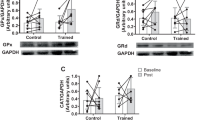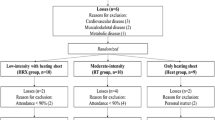Abstract
Previous studies have shown the increase of heat shock protein (HSP72) following exercise in animals. The purpose of this study was to examine the effect of type of exercise on HSP72 response in active young females. Nineteen female physical education students were randomly divided into two groups: an endurance training group (ETG) and a weight training group (WTG). The exercise protocol in the ETG included incremental running to exhaustion performed at 65–75% VO2max on a treadmill with a 0% grade. The subjects in the WTG also performed 4 sets of eccentric contractions of elbow flexors: two sets of 25 reps at 50% 1RM and two sets of 15–20 reps at 60% 1RM. Blood sampling from antecubital vein was done at baseline level (rest), mid-exercise and 30 min post-exercise in the same conditions, after a 12–14 h overnight fast. The samples were sent to a laboratory and centrifuged, and the serum used to analyse variables. A sandwich **Elisa and enzymatic assay were used for determination of HSP72 values and creatine kinase (CK) respectively. The data were analysed with repeated measures, LSD post hoc and independent t-test at p<0.05. The results showed HSP72 level alterations in mid- and post-tests were only significant in the ERG in comparison with baseline values (p=0.007, p=0.03 respectively). In addition, HSP72 level alterations within the ETG and WTG were only significant mid-test. Also CK levels insignificantly increased and decreased in the ETG and WTG respectively. The CK alterations in mid- and post-tests were insignificant between groups. Thus these results suggest that eccentric weight exercise induces a further increase in HSP72 levels.
Similar content being viewed by others
References
Moseley P (1997) Heat shock proteins and heat adaptation of the whole organism. J Appl Physiol 83:1413–1417
Walsh RC, Koukoulas I, Garnham A et al (2001) Exercise increases serum Hsp72 in humans. Cell Stress Chaperones 6:386–393
Febbraio MA, Koukoulas I (2000) HSP72 gene expression progressively increases in human skeletal muscle during prolonged, exhaustive exercise. J Appl Physiol 89:1055–1060
Khassaf M, Child RB, McArdle A et al (2000) Time course of responses of human skeletal muscle to oxidative stress induced by nondamaging exercise. J Appl Physiol 90:1031–1035
Liu Y, Mayr S, Opitz-Gress A et al (1999) Human skeletal muscle HSP70 response to training in highly trained rowers. J Appl Physiol 86:101–104
Locke M, Noble EG, Atkinson B (1990) Exercising mammals synthesize stress proteins. Am J Physiol 258:723–729
Thompson HS, Scordilis SP, Clarkson PM et al (2001) A single bout of eccentric exercise increases HSP27 and HSC/HSP70 in human skeletal muscle. Acta Physiol Scand 171:187–193
Willoughby DS, Rosene J, Myers J (2003) HSP-72 and ubiquitin expression and caspase-3 activity after a single bout of eccentric exercise. J Exerc Physiol 6:96–104
Kresfelde TL, Claassen N, Cronje MJ (2006) Hsp70 induction and hsp70 gene polymorphisms as indicators of acclimatization under hyperthermic conditions. J Thermal Biol 31:406–441
Thompson HS, Clarkson PM, Scordilis SP (2002) The repeated bout effect and heat shock proteins: intramuscular HSP27 and HSP70 expression following two bouts of eccentric exercise in humans. Acta Physiol Scand 74:47–56
Febbraio AM, Mesa JL, Chung J et al (2004) Glucose ingestion attenuates the exercise-induced increase in circulating heat shock protein72 and heat shock protein60 in humans. Cell Stress Chaperone 9:390–396
Morton JP, MacLaren DPM, Cable NT et al (2006) Time course and differential responses of the major heat shock protein families in human skeletal muscle following acute nondamaging treadmill exercise. J Appl Physiol 101:176–182
Milne KJ, Noble EG (2002) Exercise-induced elevation of HSP70 is intensity dependent. J Appl Physiol 93:561–568
Natio H, Powers SK, Demirel HA et al (2001) Exercise training increases heat shock protein in skeletal muscles of old rats. Med Sci Sports Exerc 33:729–734
Salo DC, Donvan CM, Davies KJ (1991) HSP70 and other possible heat shock or oxidative stress proteins are induced in skeletal muscle, heart, and liver during exercise. Free Radic Biol Med 11:239–246
Skidmore R, Gutierrez JA, Guerriero V Jr et al (1995) HSP70 induction during exercise and heat stress in rats: role of internal temperature. Am J Physiol Regul Integr Comp Physiol 268:92–97
Febbraio AM, Ott P, Nielsen HB et al (2002) Exercise induces hepatosplanchnic release of heat shock protein 72 in humans. J Physiol 544:957–962
Febbraio AM, Steensberg A, Walsh R et al (2002) Reduced glycogen availability is associated with an elevation in HSP72 in contracting human skeletal muscle. J Physiol 538:911–917
Gjøvaag TF, Vikne H, Dahl HA (2006) Effect of concentric or eccentric weight training on the expression of heat shock proteins in m. biceps brachii of very well trained males. Eur J Appl Physiol 96:355–362
Shastry S, Toft DO, Jouner MJ (2002) HSP70 and HSP90 expression in leucocytes after exercise in moderately trained humans. Acta Physiol Scand 175:139–146
Puntschart A, Vogt M, Widmer HR et al (1996) Hsp70 expression in human skeletal muscle after exercise. Acta Physiol Scand 157:411–417
Fehrenbach E, Niess AM, Voelke K et al (2005) Exercise intensity and duration affect blood Soluble HSP72. Int J Sports Med 26:552–557
Liu Y, Lormes W, Baur C et al (2000) Human skeletal muscle HSP70 response to physical training depends on exercise intensity. Int J Sports Med 21:351–355
Lancaster GI, Møller K, Nielsen B et al (2004) Exercise induces the release of heat shock protein 72 from the human brain in vivo. Cell Stress Chaperones 9:276–280
Pockley AG (2003) Heat shock proteins as regulators of the immune response. Lancet 362:469–476
Kim KB, Kim MH, Lee DJ (2004) The effect of exercise in cool, control and hot environments on cardioprotective HSP70 induction. J Physiol Anthropol Appl Human Sci 23:225–230
Peake JM, Suzuki K, Hordern M et al (2005) Plasma cytokine changes in relation to exercise intensity and muscle damage. EurJ Appl Physiol 95:514–521
Fehrenbach E, Niess AM, Schlotz E et al (2000) Transcriptional and translational regulation of heat shock proteins in leukocytes of endurance runners. J Appl Physiol 89:704–710
Whitham M, Halson SL, Lancaster GL et al (2004) Leukocyte heat shock protein expression before and after intensified training. Int J Sports Med 25:522–527
Gonzalez B, Hernando R, Manso R (2000) Stress proteins of 70 kDa in chronically exercised skeletal muscle. Pflugers Arch 440:42–49
Smolka MB, Zoppi CC, Alves AA et al (2000) HSP72 as a complementary protection against oxidative stress induced by exercise in the soleus muscle of rats. Am J Physiol Regul Integr Comp Physiol 279:1539–1545
Baldwin J, Snow RS, Febbraio MA (2000) Effect of training status and relative exercise intensity on physiological responses in men. Med Sci Sports Exerc 32:1648–1654
Author information
Authors and Affiliations
Corresponding author
Additional information
An erratum to this article can be found at http://dx.doi.org/10.1007/s11332-010-0096-4
Rights and permissions
About this article
Cite this article
Dabidi-Roshan, V., Rahnama, N., Abdi Hamzehkolaei, H. et al. Heat shock protein responses to eccentric weight or treadmill exercise in active young females. Sport Sci Health 5, 75–80 (2009). https://doi.org/10.1007/s11332-009-0081-y
Received:
Accepted:
Published:
Issue Date:
DOI: https://doi.org/10.1007/s11332-009-0081-y




